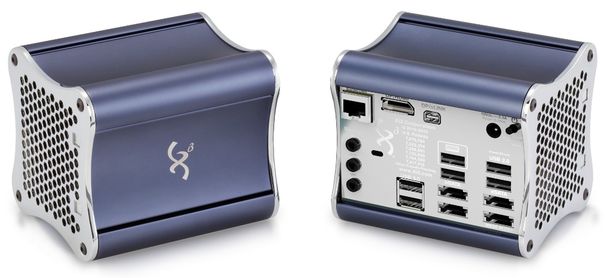
The Consumer Electronics Show isn’t really known for its gaming reveals. Even Microsoft, the company that used CES to give the very first public demonstration of the Xbox all the way back in 2001, has abandoned the expo in favor of its own press events and other outings like E3. CES 2013 seemed to buck that trend though, with the Razer Edge, Nvidia’s Shield, and, of course, the Steam Box. Xi3 showed off the very first public prototype for a small, affordable, upgradeable PC designed for living rooms with the help of Valve. Steam’s outspoken founder Gabe Newell said at the time that Xi3’s device is just the first of multiple Steam Box PCs, and on Wednesday, he confirmed that the Steam Box is coming soon – very soon.
“We’re working with partners trying to nail down how fast we can make it,” Newell told the BBC ahead of the BAFTA Awards. “We’ll be giving out some prototypes to customers to gauge their reactions, I guess, in three to four months.”
These test units will help iron out some of the kinks that keep PCs from becoming as desirable for living room décor as streamlined devices like the PlayStation 3 or modern Xbox 360.
“There are noise issues and heat issues and being able to [handle that] while still offering a powerful enough gaming experience is the challenge in building it.”
Newell hinted that some of Valve’s experiments in new game controllers and interfaces will help to set the new system apart from other gaming consoles. Throughout 2012, Valve discussed its new efforts to develop wearable computing devices that provide new types of feedback and interactivity. Based on his comments this week, Newell said the Steam Box might have a controller that measures a player’s biometrics to change dynamically.
“If you think of a game like Left 4 Dead, which was trying to put you into a sort of horror movie, if you don’t change the experience of what the player is actually feeling then it stops being a horror game,” explained Newell, “So you need to actually be able to directly measure how aroused the player is, what their heart rate is, things like that, in order to offer them a new experience each time they play.”
Competitors like Sony have patented technology that would place biometric sensors in PlayStation controllers to read a players DNA. Nintendo has also announced similar devices, like the unreleased Wii Vitality Sensor for measuring a player’s heart rate.
Newell’s statements are encouraging in one regard: It means the company is still thinking about making games rather than just machines to play them on.


